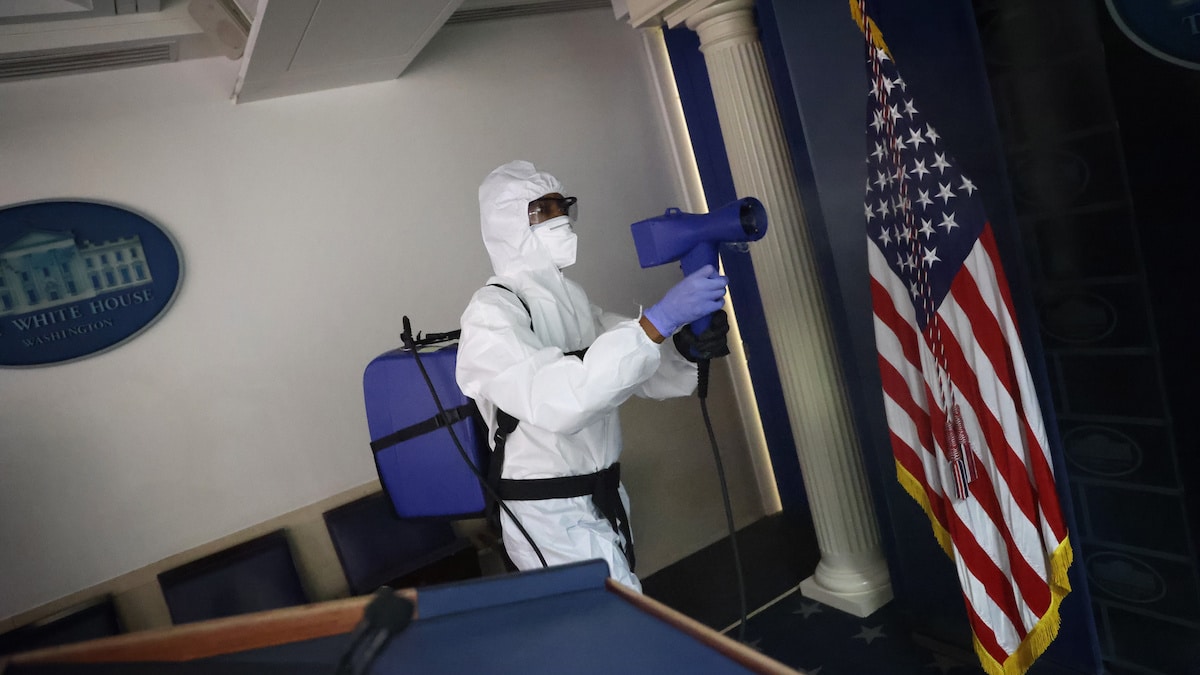
Trump Again Claims Coronavirus Less Deadly Than Flu, Prompting Facebook and Twitter to Block His Post

A member of the White House cleaning staff sanitizes the James S. Brady Press Briefing Room on Oct. 5, 2020 in Washington, DC. Donald Trump, several members of his staff, and three members of the press corps have recently tested positive for coronavirus. Win McNamee / Getty Images
Both Facebook and Twitter acted Tuesday to flag a post by President Donald Trump in which he once again downplayed the new coronavirus by comparing it to the seasonal flu.
“Flu season is coming up!,” Trump said in the post, as CNBC reported. “Many people every year, sometimes over 100,000, and despite the Vaccine, die from the Flu. Are we going to close down our Country? No, we have learned to live with it, just like we are learning to live with Covid, in most populations far less lethal!!!”
This is not true. COVID-19 has killed 210,909 U.S. residents so far, according to the most recent figures from Johns Hopkins University. That’s almost 10 times more than the 22,000 estimated deaths during the 2019-2020 flu season, following Centers for Disease Control and Prevention (CDC) figures. The 2017-2018 flu season, which was the deadliest since 2010, saw around 61,000 deaths, CNBC reported.
The coronavirus also has a much higher mortality rate, NPR pointed out. The seasonal flu usually has a mortality rate of less than 0.1 percent, while the coronavirus in the U.S. has had an estimated mortality rate of between 0.5 percent and slightly more than one percent.
Facebook removed the post altogether around 11 a.m. Eastern Time, CNBC reported.
“We remove incorrect information about the severity of Covid-19, and have now removed this post,” a Facebook spokesperson told CNBC.
Twitter did not remove the post altogether, but instead covered it with a warning that users had to click past in order to view the tweet and also prevented it from being shared. It posted the warning more than three hours after Trump wrote the tweet.
“This Tweet violated the Twitter Rules about spreading misleading and potentially harmful information related to COVID-19,” the social media company wrote. “However, Twitter has determined that it may be in the public’s interest for the Tweet to remain accessible.”
This isn’t the first time that the social media companies have had to remove Trump posts for sharing false information about the coronavirus. In August, Facebook and Twitter removed posts that included a link to a video clip in which Trump claimed that children were “almost immune” to the disease. The Facebook post was from Trump’s own account, while the Twitter post was from his campaign’s account.
It is also not the first time that Trump has attempted to downplay the risks of the coronavirus by comparing it to the flu, CBS News pointed out.
“So last year 37,000 Americans died from the common Flu. It averages between 27,000 and 70,000 per year,” Trump tweeted March 9. “Nothing is shut down, life & the economy go on. At this moment there are 546 confirmed cases of CoronaVirus, with 22 deaths. Think about that!”
However, in the time between the tweets, two key things have happened. First, journalist Bob Woodward released tapes of interviews in which Trump admitted to understanding the severity of the coronavirus more than he had revealed to the public.
“It’s also more deadly than even your strenuous flus,” he told Woodward Feb. 7.
Second, Trump himself tested positive for the virus late last week and spent the weekend in Walter Reed Medical Center. He left the hospital to return to the White House Monday, but is still sick with COVID-19, CBS News reported.
But neither the Woodward revelations nor his own experience of the disease have stopped Trump from downplaying the virus in public.
“Don’t be afraid of Covid,” he tweeted before leaving the hospital Monday. “Don’t let it dominate your life.”
- Trump 'Likely Largest Driver' of Coronavirus Misinformation ...
- Facebook, Twitter Remove Trump Posts Sharing False COVID-19 Info
- Trump Compares Coronavirus to 'Sniffles'
- White House Doctor With History of Misleading Statements Says Trump Likely Ready for ‘Public Engagements’ Saturday - EcoWatch

 233k
233k  41k
41k  Subscribe
Subscribe 